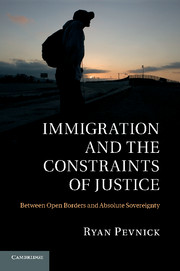Book contents
- Frontmatter
- Contents
- List of illustrations
- Acknowledgments
- 1 Introduction
- 2 Statism, self-determination, and associative ownership
- 3 Refining associative ownership
- 4 Rights-based arguments for open borders
- 5 Distributive justice and open borders
- 6 The significance of national identity
- 7 Applications
- Bibliography
- Index
7 - Applications
Published online by Cambridge University Press: 24 February 2011
- Frontmatter
- Contents
- List of illustrations
- Acknowledgments
- 1 Introduction
- 2 Statism, self-determination, and associative ownership
- 3 Refining associative ownership
- 4 Rights-based arguments for open borders
- 5 Distributive justice and open borders
- 6 The significance of national identity
- 7 Applications
- Bibliography
- Index
Summary
This chapter applies the associative ownership framework to several important policy debates including the claims of resident non-citizens and the legitimacy of attempts to militarize the border (section I). After rejecting the leading approaches to such problems, I argue that the difficulties raised by illegal immigration may be well addressed by the development of a certain type of guest-worker program (section II). Finally, I offer some brief concluding remarks on the overall argument (section III).
NON-CITIZEN RESIDENTS
There are two popular positions in regard to illegal immigration: the treatment of non-citizen residents; and border control. First, many analysts – call them integrationists – argue that justice requires that all illegal immigrants permanently residing in the territory be fully, and even automatically, integrated into the political community. Second, restrictionists – especially in the country's public debate – have generated widespread support for militarizing the border and refusing to tolerate the presence of illegal immigrants.
A Opposing integrationism
Integrationists insist that all long-term residents of a territory – including illegal immigrants – are entitled to full membership in the body politic. Ruth Rubio-Marín, for example, argues that
all those who live on a permanent basis in a liberal democratic state ought to be considered members of that democracy and thus share in the sphere of civic equality with the equal recognition of rights and duties.
(Rubio-Marín 2000, 6)- Type
- Chapter
- Information
- Immigration and the Constraints of JusticeBetween Open Borders and Absolute Sovereignty, pp. 163 - 185Publisher: Cambridge University PressPrint publication year: 2011

